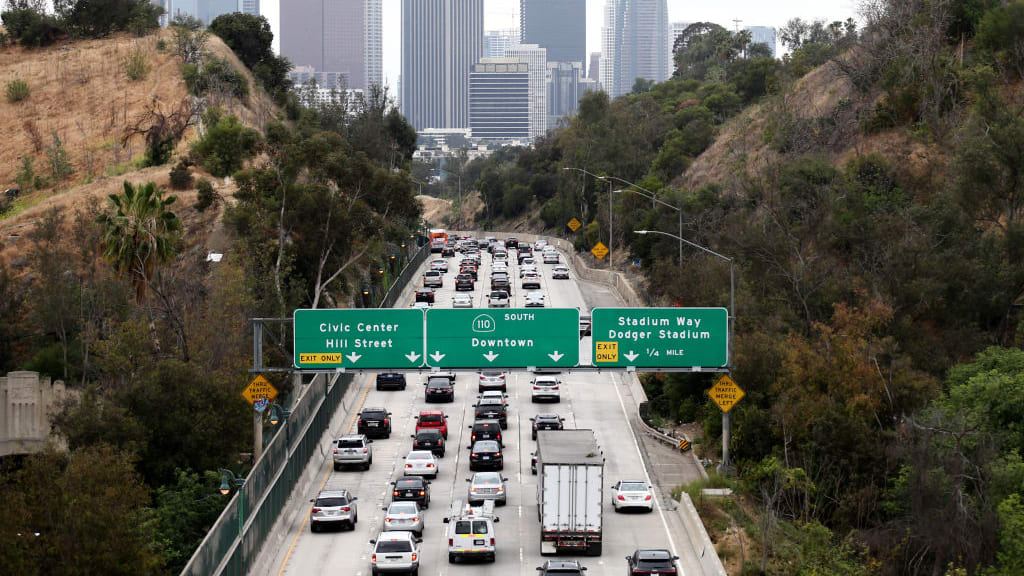California expected to ban sale of new gas cars by 2035


A free daily email with the biggest news stories of the day – and the best features from TheWeek.com
You are now subscribed
Your newsletter sign-up was successful
The California Air Resources Board will vote Thursday on a measure banning new gasoline car sales in the state by 2035.
Board member Daniel Sperling told CNN he is "99.9 percent" confident the new rules will be approved, calling the move "monumental. This is the most important thing that CARB has done in the last 30 years. It's important not just for California, but it's important for the country and the world." This comes two years after California Gov. Gavin Newsom (D) signed an executive order mandating that by 2035, all new vehicles sold in the state must be zero emission.
If the measure passes as expected, beginning with 2026 models, 35 percent of new cars, small pickup trucks, and SUVs sold in California will have to be zero emission. The quota will increase every year until 2035, when it reaches 100 percent. This does not affect used vehicles.
The Week
Escape your echo chamber. Get the facts behind the news, plus analysis from multiple perspectives.

Sign up for The Week's Free Newsletters
From our morning news briefing to a weekly Good News Newsletter, get the best of The Week delivered directly to your inbox.
From our morning news briefing to a weekly Good News Newsletter, get the best of The Week delivered directly to your inbox.
Sperling told CNN there has been "surprisingly little debate" from car companies, and "many of them have already made announcement about how they're converting totally to electric vehicles." California could lead the way for states in the Northeast and Pacific Northwest, Sperling said, which is "a big part of the U.S. market. Even if the feds don't move on a regulatory perspective, a big chunk of the country will be moving forward."
A free daily email with the biggest news stories of the day – and the best features from TheWeek.com
Catherine Garcia has worked as a senior writer at The Week since 2014. Her writing and reporting have appeared in Entertainment Weekly, The New York Times, Wirecutter, NBC News and "The Book of Jezebel," among others. She's a graduate of the University of Redlands and the Columbia University Graduate School of Journalism.
-
 How the FCC’s ‘equal time’ rule works
How the FCC’s ‘equal time’ rule worksIn the Spotlight The law is at the heart of the Colbert-CBS conflict
-
 What is the endgame in the DHS shutdown?
What is the endgame in the DHS shutdown?Today’s Big Question Democrats want to rein in ICE’s immigration crackdown
-
 ‘Poor time management isn’t just an inconvenience’
‘Poor time management isn’t just an inconvenience’Instant Opinion Opinion, comment and editorials of the day
-
 The plan to wall off the ‘Doomsday’ glacier
The plan to wall off the ‘Doomsday’ glacierUnder the Radar Massive barrier could ‘slow the rate of ice loss’ from Thwaites Glacier, whose total collapse would have devastating consequences
-
 Can the UK take any more rain?
Can the UK take any more rain?Today’s Big Question An Atlantic jet stream is ‘stuck’ over British skies, leading to ‘biblical’ downpours and more than 40 consecutive days of rain in some areas
-
 As temperatures rise, US incomes fall
As temperatures rise, US incomes fallUnder the radar Elevated temperatures are capable of affecting the entire economy
-
 The world is entering an ‘era of water bankruptcy’
The world is entering an ‘era of water bankruptcy’The explainer Water might soon be more valuable than gold
-
 Climate change could lead to a reptile ‘sexpocalypse’
Climate change could lead to a reptile ‘sexpocalypse’Under the radar The gender gap has hit the animal kingdom
-
 The former largest iceberg is turning blue. It’s a bad sign.
The former largest iceberg is turning blue. It’s a bad sign.Under the radar It is quickly melting away
-
 How drones detected a deadly threat to Arctic whales
How drones detected a deadly threat to Arctic whalesUnder the radar Monitoring the sea in the air
-
 ‘Jumping genes’: how polar bears are rewiring their DNA to survive the warming Arctic
‘Jumping genes’: how polar bears are rewiring their DNA to survive the warming ArcticUnder the radar The species is adapting to warmer temperatures
